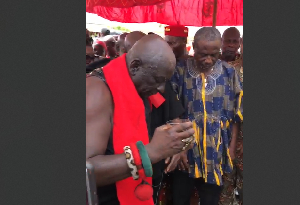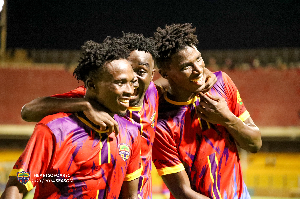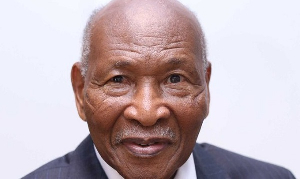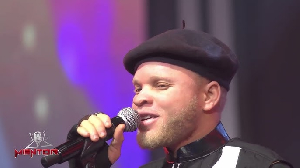Opinions of Friday, 27 October 2023
Columnist: Professor K. Dei Ofori-Attah
The social structure of political parties in Ghana: Its impact on the nation’s democratic governance
The social structure of political parties in Ghana is an essential component that shapes the dynamics and operations of the country's political landscape. Ghana's political parties are deeply interconnected with its societal fabric, reflecting various social divisions and disparities.
Since independence in 1957, Ghanaians have formed more than 50 political parties to compete for political power in Ghana. Some are active, and others are defunct. However, the two most viable and active ones are the New Patriotic Party (NPP) and the National Democratic Congress (NDC), all founded in 1992. The primary function of political parties is to select and sponsor candidates for political office. How this is done is the central theme of the paper.
This essay analyzes and critically examines the social structure of political parties in Ghana, exploring their composition, influence, and impact on the nation's democratic governance.
The history of political parties started on August 4th, 1947, at Saltpond, Central Region, when Mr. George Alfred Grant (Paa Grant), a wealthy businessman, Dr. J.B. Danquah, Edward Akufo-Addo, R. A. Awonoor-Williams, Ebenezer Ako-Adjei, Emmanuel Obetesebi-Lanptey, and others formed the United Gold Coast Convention (UGCC) to agitate for political independence for the country. The UGCC was made up of people of different ethnic and social backgrounds.
The United Gold Coast Convention had —George Grant (Chairman), Vice Presidents Dr. J. B. Danquah (Accra), K. Bentsi-Enchill (Central), R.S. Blay (Western),
Awoonor-Williams (Treasurer), Dr. Johnson (Secretary), Albion Mends (Financial Secretary). Nkrumah later joined the highest hierarchy of the UGCC and assumed the position of General Secretary. The unique aspect of the UGCC was its recognition of diversity in the fight for independence for the country.
The complex relationship between ethnicity, politics, and social structure is an ongoing debate and research among scholars in Ghana and beyond. The place of ethnicity in the distribution of political power is very complex in Ghana. According to the 2021 data on ethnicity distribution in Ghana, Akans constitute 45.7 percent of the population. The Mole-Dagbani group comprises 18.5 percent, the Ewe 12.8. percent, the Ga-Adangbe 7.1 percent, the Guan 3.2 percent, the
Gurma 6.4 percent, Grusi 2.7, Mande 2.0, and the rest 1.6 percent. (See Doris Dokua Sasu, 2023).
This division implies that a political party based on the Akan doctrine of unity will always win power. This is far from the point. The other political parties, like the Convention People’s Party (CPP), have always had a way of outwitting the main Akan-based parties, like the United Party (UP), through political strategies, alliances, propaganda, social and political structures, and
clear campaign messages. Until the 1966 military intervention, the CPP used its superior political strategy and a vast network and social structure to win all general elections in the country.
To begin with, Ghana's political parties are primarily structured based on ethnic and regional affiliations. This structure evidences the significant influence of social divisions in party politics. Political parties in Ghana often exhibit a bias towards particular ethnic or regional groups, creating a sense of exclusivity rather than inclusivity within the political sphere. This
intricate association between social groups and political parties has the potential to either promote unity or escalate divisions within society, depending on the parties' intentions and the approaches they adopt.
The NDC has strength in the Volta Region, the country's northern regions, with strong support from Greater Accra, Western Region, Brong, and the Oti Regions.
On the other hand, the NPP has strong roots in Ashanti, Eastern, and Ahafo and a tight support base in the northern regions. Central Region has often been a battleground for the two major parties, NDC and NPP.
Another crucial dimension of the social structure of political parties in Ghana is their connection to social classes. Political parties often align themselves with different socioeconomic groups, either explicitly or subtly. Parties tend to attract support from specific segments of the population based on factors such as income, education level, and occupation.
This alignment reinforces the stratification of Ghanaian society and contributes to the perpetuation of social inequalities. The correlation between social class and political party affiliation can shape the policies and discourse presented by these parties, further influencing Ghana's political landscape. Historically, the NDC, the offshoot of the CPP led by Dr. Nkrumah, has drawn more support from rural areas than the NPP, the derivative of the UP led by Dr. Busia. This tradition started during the colonial days when the CPP drew the veranda
boys and girls from all parts of the country to form the party's main base.
To date, all political party leaders have come from high social backgrounds. President John Agyekum Kufuor, Nana Ado-Danquah, and John Arthur Mills had higher educational backgrounds before seeking the political mandate to lead the country. The intellectual giants in the political arena of Ghana include Dr. J.B. Danquah, Dr. Kofi Abrefa Busia, and Dr. Hilla Liman. Kwame Nkrumah used his high social status and high academic background as the secretary general of the United Gold Coast Convention (UGCC) to attract the verandah boys and girls in the country to torpedo his Convention People’s Party (CPP) to the pinnacle of
politics in Ghana from 1947, till he lost power in 1966.
Apart from ethnic and class divisions, religious affiliations form another significant aspect of Ghana's social structure of political parties. Religion plays a prominent role in Ghanaian society, and this prominence inevitably carries over into political discourse. Although Ghana is known for its religious tolerance, political parties often align themselves with specific religious
groups to capitalize on their support and gain electoral advantage.
This interplay between religion and politics can deepen social divisions based on religious identity and undermine the secular nature of the state. The social structure of political parties is also reflected in the selection of political leaders and their running mates. Some people avoid joining or voting for particular parties because they may not share the same religious faith or practice as their leader.
So, what many political leaders do to cushion this ill feeling is to select a presidential running-mate with a different religious, ethnic, or social background. During the 1979 Presidential Elections, Victor Owusu (a Christian from the south) of the Popular Front Party selected Tolon-Na Alhaji Yakubu Tali, a Muslim from the northern part of the country. During the same period, Dr. Hilla Limann (a Christian from the north) selected Dr. J.W.S. De Graft-Johnson (a Christian) from the south as his running mate.
This north-south dialogue has usually been a convenient political arrangement
for the two main parties, NPP and NDC, in the country. However, there have been a few occasions when this political arrangement was paused or squashed.
Gender dynamics also play a crucial role in the social structure of political parties. Women have played active politics since the colonial days. During the 1954 general elections, the CPP fielded the only woman candidate for the party, Mabel Dove, to contest in the Ga Constituency in the Colony. She polled 3,331 as against 417 votes polled by Mr. N.A. Ollenu of the Ghana Congress Party (GCP), led by Dr. K. A. Busia. Consequently, she became the first elected female legislator. During the same period, the GCP fielded a woman, Mrs. Nancy Tsiboe, a one-time Secretary-General for the Women Wing of the NLM, but lost to the CPP candidate, Mr. E.O. Asafu-Adjei of CPP at the Kumasi South Constituency.
The two leading political parties in Ghana have paid attention to integrating women into the higher echelons of political parties in Ghana. In the 2020 presidential elections, President John Mahama selected a woman, Professor
Jane Naana Opoku-Agyemang, to be his running mate. Many women have been given
ministerial appointments to make politics attractive and meaningful for women.
All the major political parties in the country have women-wing organizations that support the organization and administration of each political party. A plethora of research indicates that women comprise around 51% of the population of Ghana.
However, there is a disparity in the gender distribution in the parliamentary representation. This disparity is due to a lack of women's resources to compete with men for political positions. In 2011, women comprised only 8.3% of the total parliamentarians. By 2021, the number had increased to 14.8%. All the political parties in Ghana use women's power to do grassroots organization for votes.
They do this through what is generally called Women's National Organizers. The composition of these women's organizations cut across ethnic, family, regional affiliations, educational, or social backgrounds. In the 8th parliament, the leading political parties, the NPP and NDC, have 20 women parliamentarians. Regarding regional representations, Greater Accra has more women in parliament than any of the other regions. Six are from the NPP, and seven are from the NDC. Ashanti region has five women parliamentarians. The
Central Region has six women parliamentarians.
The Eastern and Volta regions have eight women in parliament, four for each region. The regions with the least number of women representations are the Ahafo, Bono East, North East, Oti, Savanah, and Western regions. Each
has one woman in parliament.
The political influence of Mrs. Konadu Agyeman-Rawlings is something that must be recognized. In the 2020 Presidential elections, Mrs. Agyeman-Rawlings gathered enough courage to challenge the might of the National Democratic Congress, NDC, a political party founded by her husband, late President Rawlings. Today, we hear of Madam Akua Donkor, who has also formed her political party, the Ghana Freedom Party (GFP), to participate in the political system at the highest level of national politics.
Madam Akua Donkor has emphasized grassroots mobilization and empowerment of ordinary Ghanaians. Her political agenda centers on advocating for the rights of farmers, women, and vulnerable groups in society. With the late entry of women into the political structure of Ghana, these modest representations are
indications that women in Ghana are fighting to entrench their social structure in political parties in Ghana.
Additionally, the social structure of political parties in Ghana can influence voter behavior and political mobilization. Voters often align with parties representing their social identity and interests, reinforcing the connection between social divisions and political affiliation. This relationship manifests in voting patterns along ethnic and regional lines, perpetuating the
dominance of specific parties in particular areas. Such voting behavior consolidates the social structure of political parties and can hinder the formation of inclusive and representative democracy.
Perhaps hard-core supporters of political parties do not change their allegiance to their parties. They see their attachments to political parties as fixed, unchangeable, and immutable! Thus, William Ofori-Attah could not take the hard-core members of the PFP with him when he broke ranks with the PFP in 1978. Similarly, when Nana Konadu Agyemang-Rawlings broke away from the NDC to form her political party, the National Democratic Party (NDP), in 2012, she could not even carry with her some members of her own family.
Currently, it seems both the NPP and NDC enjoy an equal number of hard-core supporters in the country. NPP is estimated to hold about 46% and NDC 45% of the entire population. Floating voters make up the rest, about 9%. Whoever can capture this group carries the day. It is interesting to note that the social structure of the floating voters, like hard-core supporters or voters, is as complex as one can imagine. The floating voters usually cast their votes based on character, demeanor, public utterances, family ties, and the economy before learning one way or the other.
Another critical aspect of the social structure of political parties in Ghana includes the family system, extended as well as the nuclear types. The impact on this family's social structure of political parties stretches from colonial times to modern times. In light of its significance, researchers have emphasized the essential role of the family in the organization and formation of political parties in Ghana. During the 1979 presidential elections, Alhaji Imoru Egala, a staunch member of the CPP and later a founding father of the PNP party, had wanted to be the presidential candidate for the PNP. Later, when he was legally disqualified from contesting as president of the Republic of Ghana, he hand-held his nephew, Dr. Hila Limann, to replace him as a presidential candidate for the PNP.
Dr. Hila Limann eventually won the presidential elections and became the preside of Ghana. Of all the members of the Big Six, only the Ofori-Atta family
has continued to exert more significant political influence on the social structure of various political parties in Ghana. Others, such as the Blay, Bawumia, Nkrumah, and Rawlings families, have done this on a limited scale.
In the 1979 general elections, the PNP defeated the PFP because of the large internal divisions within the PFP party. When William Ofori-Attah broke away from the PFP, he won 17.4% of the total votes; the PFP won 29.9%, and the PNP won 35.3%. Since none of the political parties won more than 50% plus one or more of the votes, as required by the Constitution to form a government, the Electoral Commission of Ghana organized a round-off presidential election.
During the presidential run-off, Mr. Ofori-Atta of the UNC openly urged his supporters and sympathizers to vote for the PNP party led by Dr. Hila Limann. The PNP, assisted by the UNC party, won the run-off elections by capturing 62% to Owusu's 38% of the final votes. Mr. William Ofori-Atta pulled many hard-core supporters, floating voters, and sympathizers to vote for the PNP party. The PNP and UNC alliance brought Dr. Hilla Limann the victory he had wished for. For his reward, the PNP party appointed Mr. William Ofori-Atta, the presidential candidate for the UNC, the Chairman of the Council of State.
Unfortunately, the UNC political party, led by Mr. William Ofori-Atta, failed to significantly impact Ghana's politics after the 1979 elections. All the elements in the party, mostly Ewes, Gas, and other floating supporters, recoiled into their previous “home rooms” or political roots after the 1979 showdown with the PFP party led by Mr. Victor Owusu.
An essential component of the social structure of political parties in Ghana is what is now commonly called foot soldiers. Foot soldiers are often young boys and girls who try to win power for their political parties through any means they deem fit or necessary. These foot soldiers often have limited education or professional skills and so depend on the success of their
political parties at the polls for their livelihood. Foot soldiers spend countless hours campaigning for their respective candidates.
They offer protection and security for their candidates during elections. Once power is won, they expect to be heavily rewarded by their party. After winning
power, many foot soldiers get top government positions as political appointees. Often, these political appointees are not fit for their positions. However, they remain in office simply because their party is in power. This practice is against the principles of meritocracy in the civil service.
This situation became frequent and rampant during the CPP days when the government used “verandah boys” to fill top government positions. On the other hand, many foot soldiers without any higher level of education are overlooked in terms of job offerings. When this happens, these foot soldiers consequently resort to violent actions against their party in power.
Foot soldiers' political and social history dates back to the colonial days during the fight to form the country's next government. The Convention Peoples Party (CPP) had a group of ruthless young men and women in their quest for political power. This group was called “Action Troopers.” Members of the Action Troopers often engaged in political violence that sometimes resulted in the death of political opponents in many places in the country.
The National Liberation Movement political party also had a similar group called Action Groupers. Alex Osei, a prominent Ashanti man, led this group. Both the Action Troopers and Action Groupers committed lots and lots of atrocities against their opponents.
Political leadership in Ghana can be described as the “circulation of elites.” No leader of a political party in Ghana is not elite. On February 21, 1966, when President Nkrumah left Ghana for Hanoi on a peace mission, he selected three elites to act in his absence because he had no vice president. The three elites formed the Presidential Commission. They were Nana Freku, the third President of the Western Region House of Chiefs, Mr. N. A. Welbeck, Minister of State for
Party Propaganda, and Opanyin Kwame Poku, National President of United Ghana Farmer’s Cooperative Council.
One significant thing about members of the Presidential Commission was that they represented different spectrums of society; Nana Freku the Third represented chiefs; Mr. N.A. Welbeck, the Minister of State for Party Propaganda, represented politicians, and lastly, Opanyin Kwame Poku, National President of the United Ghana Farmer’s Council, represented farmers in the country.
One of the main functions of a political party is to organize people with different political, social, religious, or family ties to win political power and set the agenda for national development based on their vision and ideology. The broad base of such arrangements offers potential political leaders the opportunity to send inclusive campaign messages that make everyone a recognized party member. Nkrumah set up the Seven-Year Development Plan in 1964 to display his socialist agenda for national development.
The main message behind the Seven-Year Development Plan was that it was designed to improve the living conditions of all Ghanaians, irrespective of their ethnic or regional background. The Busia administration of the Progress Party in 1969 set up a national agenda for rural development to improve the living conditions and standards of people living and working in rural communities. The New Patriotic Party (NPP) (2017) also designed a national program to provide many social programs, including the famous Free Senior High School models. More than 405,000 students from all social backgrounds have benefited from this scheme.
In conclusion, the social structure of political parties in Ghana is shaped by various social divisions, including ethnicity, social class, religion, gender, and marginalized community representation. These divisions often perpetuate inequalities and exclusions within the political sphere and spectrum. Understanding and critically analyzing the social structure of political
parties are crucial for developing strategies to promote inclusive and representative democracy in Ghana.
Political parties that overlook the impact of the social structure of Ghana on voter behavior often suffer “humiliating” defeats, as happened in the country during colonial times. For instance, during the 1954 general elections, the Convention People’s Party (CPP) developed a robust social structure and network to defeat the other political parties. The political parties that were defeated during the general elections included the Northern People’s Party (NPP), Ghana Congress Party (GCP), Anlo Youth Association (AYA), Ghana Nationalist Party (GNP), Muslim Association Party (MAP), Togoland Congress Party (TCP) and Ghana Action Party (GAP). Efforts to bridge the ethnic and social divisions to foster political inclusivity are essential in achieving social justice and strengthening Ghana's young democracy.













